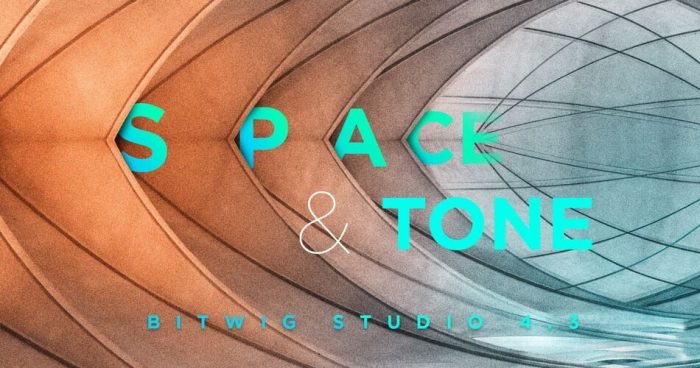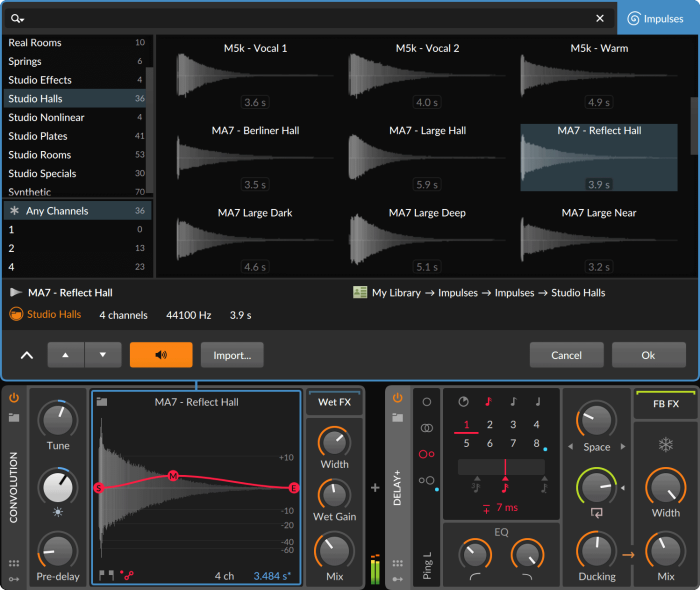Bitwig has announced details on the upcoming update its music production software for Windows, Mac and Linux.
Bitwig Studio 4.3 includes a new Convolution device, a boutique delay effect, an update to Polymer and The Grid modules, and more.
When searching for new sounds, do you focus on the processors? Or is it the generators that make the difference? Bitwig Studio 4.3 is here, bringing space and tone, with a convolution device for real and imagined spaces, a new delay that loves the spotlight, and some downright electric components for our synths.
New Convolution Device
Bitwig’s new Convolution device can take any sound anywhere, even places that don’t exist. All convolutions imprint sound with an “impulse,” and ours comes ready-made with 270 of them, ranging from 12th-century cathedrals and legendary studio effects to more abstract “environments.” Using the impulse of a room or hall creates a realistic reverb, but Bitwig’s Convolution and content offers so much more.
You can easily adjust color and tone, or draw your own envelope to reshape the impulse itself. Plus, since “true stereo” (four-channel) files as well as loading any audio as an impulse is supported, you can drag and drop anything onto Convolution and see what impossible space you land in.
Delay+
Delay+ is Bitwig’s latest boutique audio effect. By balancing familiar controls along with a few thoughtful new ones, Delay+ can either add a little character or fully transform your sound as it ping-pongs along.
Set the delay in seconds or beats, then nudge each channel a few milliseconds for instant stereo. Pick from five Blur options to go from a lightly animated feedback to a full, blown-out reverb. A Ducking control keeps things under control by quieting your delay cloud when strong signals arrive.
Bitwig’s nested structure allows you to drop our Pitch Shifter, or Flanger+, or any VST plugin into the feedback loop. So whether you just need a little slapback or a colorful wash of sound, Delay+ has you covered.
Polymer Overhaul and New The Grid modules
Polymer and The Grid use the same modules, so when something new comes along, everybody wins. For Bitwig 4.3, some analog-inspired goodies have arrived.
Two modules are new. Union is an oscillator that plays it straight, blending three waveshapes into one pleasant, drifting output. And for filtering, Low-pass MG honors Mr. Moog by imitating both his classic filter and mix buss.
But plenty of other features have also arrived. The Low-pass SK filter is now Sallen-Key, with 16 modes on tap. Our Comb filter gained a Damping control for a touch of finesse. ADSR and two other envelopes now have added modes for Digital precision, or Analog simplicity and feel. Plus all filters get a Q Limit to rein in their resonance, and all oscillators have more phase mod range for more brittle, digital sounds. So whether starting a sound in Polymer or growing a world in The Grid, new sounds are at hand.
The update includes various other new features:
- FX tracks now have sends of their own. And yes, direct feedback routings are available — and clearly labeled. (Achtung!)
- ADSR module with added “bias” out port for a bipolar signal that centers around sustain.
- Comments can be freely added to tracks, layers, Arranger cue markers, and Launcher scenes — in any language.
- Linux installers are now Flatpak files, and Bitwig Studio is supporting PipeWire, a new audio system available on Linux.
Bitwig Studio 4.3 is now in beta and can be tested by anyone with a Bitwig Studio license and an active Upgrade Plan. The installers are available in your user profile. All of the updates to Polymer are also available for Bitwig Studio 16-Track customers, as well as the new comments functionality.
The official release is planned for Q2 2022. This is a free update for all license holders with an active Upgrade Plan.
More information: Bitwig




